When Form Meets Content
Daughters of Lorraine Podcast Season 2 Episode 5
Leticia Ridley: Welcome to Daughters of Lorraine, a podcast from your friendly neighborhood Black feminists, exploring the legacies, present and futures of Black theatre. We are your hosts, Leticia Ridley—
Jordan Ealey: And Jordan Ealey. On this podcast, we will discuss Black theatre history, conduct interviews with local and national Black theatre artists, scholars and practitioners, and discuss plays by Black playwrights that have our minds buzzing. So please stay tuned.
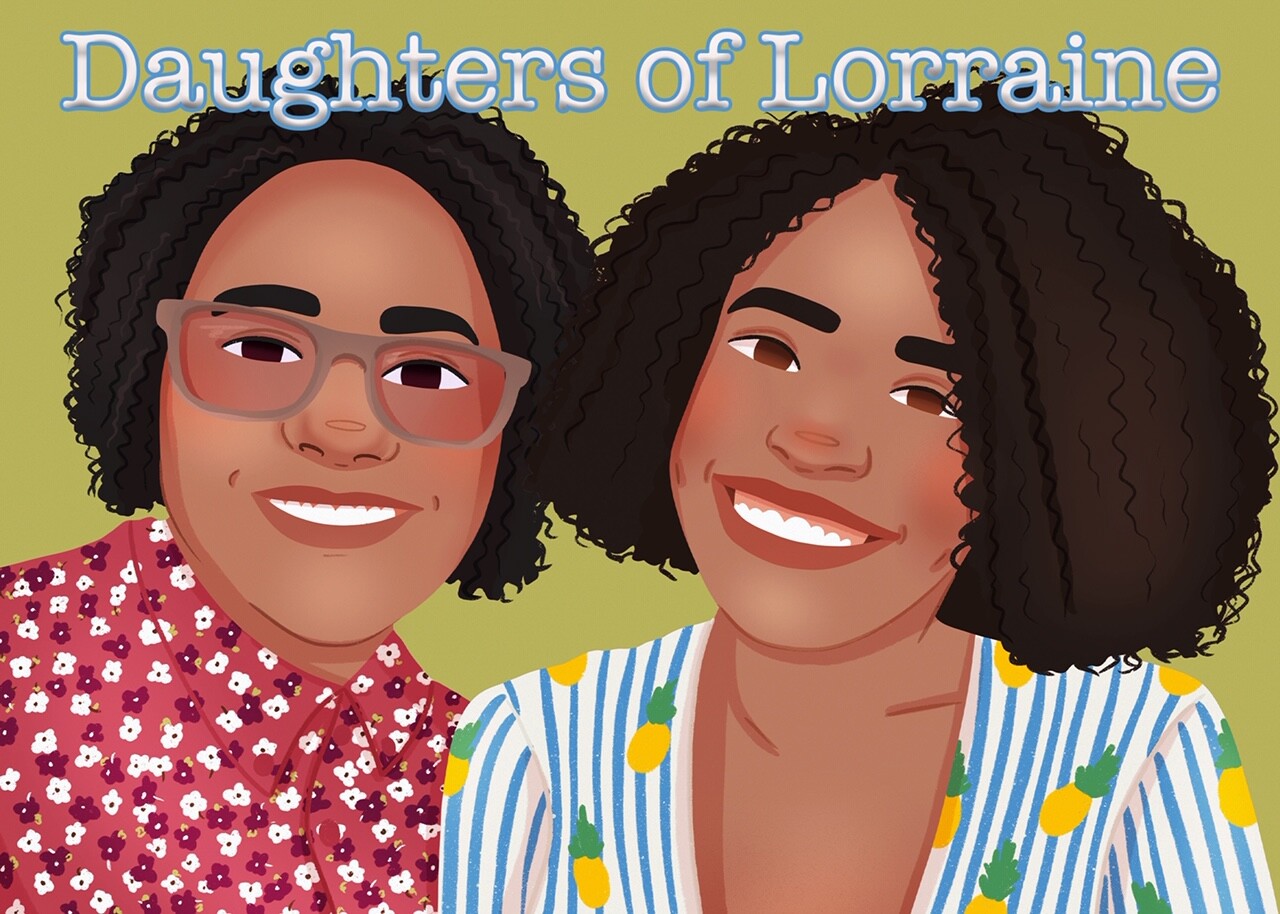
Daughters of Lorraine Podcast logo by Clarissa Bittes.
Jordan: In his essay, Black Black Theatre in Style and Form, Black theatre scholar Errol Hill questions the form of Black theatrical practice. Hill writes, quote, "The process of imitation has become too ingrained for an authentic Black theatre to emerge without a conscious attempt to reject what is alien and to seek true origins by an examination of the past and an awareness of present continuities," end quote. Pointing out conventions such as the use of the proscenium, the employment of Black music, the nuances of Black speech, and the performance style of the Black church, Hill points out an under-theorized element of the discussion on Black theatre: its form. Oftentimes, Black theatre is relegated to conversations that focus solely on its content, obscuring the ways that Black artists have revolutionized the way theatre is written, devised and performed.
Leticia: So in today's episode, we'll be discussing the interplay between content and form in Black theatre practice. We focus on how playwrights such as Adrienne Kennedy, Suzan-Lori Parks, and Tarell Alvin McCraney are artistically experimenting with theatrical form, and how that informs the reception and discussion around their work. In our exploration of these wonderful practitioners, we wonder: just what happens when form meets content?
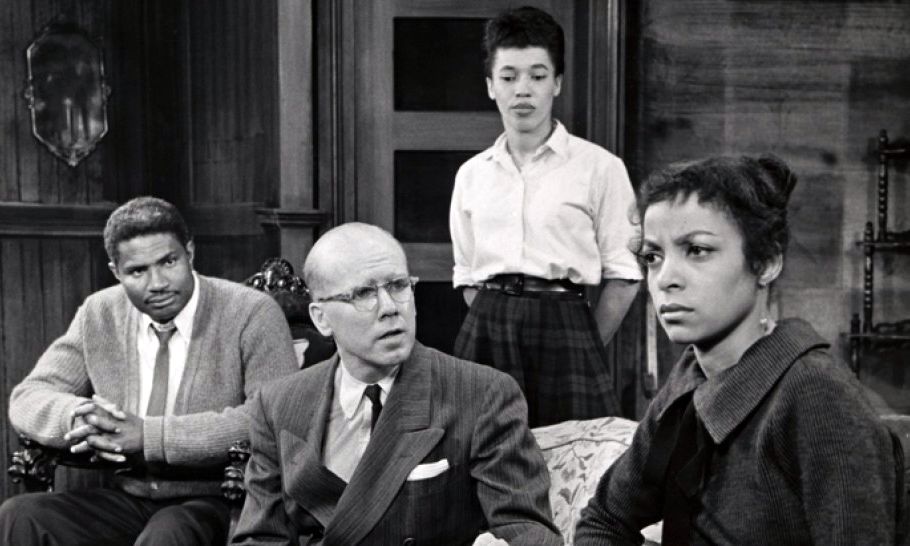
The original Broadway cast of A Raisin in the Sun. Photo courtesy of the New York Public Library.
Leticia: Welcome, y'all, to another episode of Daughters of Lorraine. We are so happy that you decided to join us. Today we are going to be diving into form.
Jordan: Yeah, yeah, this is something that Leticia and I have really thought about ever since we heard Dr. Isaiah Wooden, who is a professor at Brandeis University, talk about in a panel at ATHE [Association for Theatre in Higher Education], where he asked a question about, “well, why don't we talk more about form, rather than only talking about content?” That really probed us to think about how we either do or don't actually teach about this or write about this or even think about this when we are researching and practicing Black theatre. So that is where that episode was birthed. I'm so happy that we're finally sitting down and talking about this.
Leticia: Yes, definitely. I think in doing preparation, research for this episode today, I think I even was sort of shocked that form is not something that we always talk about within Black theatre, both scholarship and practitioner work, and thinking about how there's been a cohort, a genealogy of Black theatre practitioners who are out here really innovating and pushing form in new ways. And this is to say, not just pushing Black theatre in new ways, but the theatre at large, right? To consider how form can be used and exploded and expanded in new ways. So I'm really excited to talk with you, Jordan, about it, but also just to have our listeners listen in on the conversation, and perhaps they'll learn something new as well.
Jordan: Yeah, and chime in on Twitter and all the other ways that folks are communicating with us. So let's dive into this essay that you and I came across when doing research for this for thinking about form in Black theatre. That essay is Black Black Theatre in Style and Form by Errol Hill, who is one of our foremost, most prominent scholars of Black theatre, who's really instrumental in getting Black theatre to be taken seriously as an academic research area. In this essay, Hill is really probing us and questioning about how we approach how Black theatre is made, and what even constitutes this thing called Black theatre.
Leticia: Yeah, what I think I really love about this essay from Dr. Hill is that he is really thinking about how Black theatre is so influenced by things that happen outside of the theatre, and how Black culture itself is inherently theatrical. He cites the Black church as a place where Black theatre takes from, he cites the juke joint, the nightclub, and all these different places where Black people are pushing forms in different ways.
I think what he's really getting us to sort of think about is, what does it mean to start Black theatre there and not start Black theatre when we just put Black people onstage, utilizing the styles and form of white European theatrical practice?
Jordan: Yeah, and what I really love about this essay is that he's thinking about space, right? Like, the actual spatial arrangement of the theatre are also informing how Black people are creating it. So he's really very critical of the usage of the proscenium, right? He's like, how can we say that we're doing Black theatre when we're just doing what the Western folks are doing, right? And even the actual re-orientation of the space is already inherently informing a new kind of practice, which leads us into something like call-and-response, which, like you said, comes from a Black church perspective, performance perspective. And how that relationship from the audience to the performer just collapses that boundary in a way that opens up a new possibility for how theatre can be performed and practiced.
Leticia: Yeah, and I think that's a very particular thing to Black theatre form, is this relationship with the audience. Especially when we're leaning on traditions of call-and-response, but thinking about how the audience is actually integral and important to the theatrical event, the Black theatrical event that happens within the walls of theatre. And also just thinking about the expansion of Black theatre at large; I love that he's sort of citing all these different places that he says influences Black theatre. I would perhaps even expand his thinking to sort of think about how these spaces are within themselves sort of Black theatre and Black theatrical ... maybe not in the traditional ways that we understand what is theatre, but expanding where performance or Black performance happens. We get to someone like Zora Neale Hurston in Characteristics of Negro Expression, where she's also sorting, well, prior to Dr. Hill, getting us to sort of think about Black performance in all these different spaces.
Jordan: Characteristics of Negro Expression is one of those essays that you have to read when you're studying or thinking about Black performance. Zora Neale Hurston is definitely probably credited as being the originator of thinking about Black performance in this way. They certainly cite her in the introduction to Black Performance Theory, edited by Thomas DeFrantz and Anita Gonzalez, as being one of the first thinkers that were getting, that's theorizing what Black performance is. So some of the things that she points out are things like adornment, stuff about language, things about angularity, right? Angularity is a huge one that she is pointing out as this lack of symmetry, which actually makes Black performance difficult to understand and to learn if you're not ingratiated into that culture. I think that what Hurston is trying to get us to think about is that Black theatre or Black performance does not have a set way of doing things. It's not like, this is what theatre is to Black people. But at the same time, we do have our own specific set of guidelines that are embodied knowledge, if you will, right? You just know what to do if you have that relationality.
Leticia: Yeah, it's like when you go to a Black wedding, you know that you're gonna be Electric Sliding.
Jordan: Right. Yeah, you do.
Leticia: This is not to say other cultures do not Electric Slide at their weddings, but there's a certain call-and-response language that, even if you never set foot in a church, you might know the right response to have when someone says a particular thing, that I think is, like you said, embodied. But I think it also gives us a language to think about the spontaneity of form in Black theatre, and how Black theatre practitioners are really pushing us to not be confined by how we understand theatre and how we think about it. So if we look at someone like George C. Wolfe with The Colored Museum, he's really expanding what form can look like in the theatre with a set of vignettes that are not linear and perhaps may not be connected, even though we sort of get this final moment where they connect at the end, or where we have certain characters come back into our frame, but actually thinking about Black theatrical practice as inherently spontaneous ... maybe spontaneous is not the right word, maybe ...
Jordan: It connects, but it doesn't have to connect in this traditional way, right? He has this thing that he wants to explore, he wants to explore this kind of Black identity and this intra-racial politics among the Black community, but he does so in a way that's not expected. It's not a family drama. In fact, he's very critical of the family drama, and he's critical of the ways that Black performance is exploited in these different ways, through Ebony magazine, through the actual American theatre industry, through the music industry. He's very critical of how Blackness is commodified, and he does so through critiquing these sort of Black institutions that also traffic in similar kind of problematic and troublesome logics as white ones.
Leticia: Yeah, even to go sort of back to your point about where he's critical of the family drama, the three plays that I think he cites from there, there's three, right?
Jordan: It's Raisin, right?
Leticia: Raisin.
Jordan: I know For Colored Girls.
Leticia: For Colored Girls.
Jordan: But I'm sure you could have a—
Leticia: I think some folks say sometimes Baraka or Dutchman.
Jordan: Dutchman, yeah.
Leticia: A Dutchman or something, that one's a little bit more contested than the other two, but I think even inherent in that critique is inherent the form, right? The refrain at the end of that section is that no Black people die in an all-Black musical or something like that. I think he's talking about the content, but I think inherently he's talking about the form of the family drama not being able to fit Black experience, Black ways of doing, Black ways of being that I may not necessarily agree with as the number-one fan of A Raisin in the Sun. But I think what he wrestles with and what he gets us to think about is how the model of white, Western way of doing theatre is not always ... does not always allow for the expansiveness of Blackness to live. There's a limit to it, there's a certain storyline or a certain thing that it has to buy into that can be harmful to Black folks.
Jordan: Absolutely. And I like that kind of critique. I love that you pointed that out, this kind of critique of form that's inherent in The Colored Museum, it's actually embedded in the fabric of that play, but also in the actual content of that play, it's a critique about the form that is not, like you said, sufficient enough to hold the complications or the complexities of Black experience. I love that. Something else, too, alongside Errol Hill and Characteristics of Negro Expression, Zora Neale Hurston also talk about the juke joint and how the juke joint is our kind of ... the spatial logic or the spatial arrangements of the juke joint are also inherent to Black theatre and performance. And how, because we're ... it's this constant interaction between the performers and the audience, and there's no big boundary among them. I mean, this is even in a proscenium play. For example, when I went to go see, I believe it was Paradise Blue by Dominique Morisseau, in True Colors Theatre in Atlanta, Georgia, I happened to go on Black Greek Night, so we had an audience full of folks who attended HBCUs ... and that doesn't mean all of them went to HBCUs, but a lot of them did, because there was a call-out at the beginning where you had to call out the college you went to and also the organization you're a part of. So there was already that call-and-response that was happening going into the play, and then nobody was shy about talking back to the play about the things that were happening in it and humming along to the music and being involved with the performers. There was just no boundary between what the performers were doing onstage and what we were doing as audience members. I appreciated that theatre experience so much, because you and I experience this all the time, we'll go to a very white theatre, but we're seeing a show by a Black playwright. We'll want to talk to what's happening on the stage, but other audience members may not be so inclined to do so.
Leticia: Yeah, my best theatrical experiences are when the theatre audience doesn't feel like they have to be quiet, that they can talk back and talk with the performance. To a certain extent, because you don't want someone talking the whole time, but I think there's just so much energy with that. I think, for me, the theatre, I love theatre so much, is because of the relationality that it allows to happen in time and space with other folks. I love, like most Black plays, and as someone who is a playwright, I always use Black music in my work. Sometimes it's music that I know, so I want to be jamming along to and swaying. It doesn't always have to be a verbal call-and-response, but just having your body move or your foot tap, I think engages a relationship with the actors that I think Black theatre often does really well, and especially if there is an audience of majority Black folks, or even people of color who can sort of understand that what is happening is an exchange, and that there is energies being traded or exchanged.
Jordan: Yeah, and actually some, a group of artists who are very much thinking about challenging form were the artists of the Black arts movement, right? We have your Amiri Barakas, you have your Ed Bullins, you have your Sonia Sanchez, and you also have someone who sometimes gets talked about, but sometimes not, and that is Miss Adrienne Kennedy.
Leticia: Yes, Adrienne Kennedy, legend, still with us, still out here writing plays. And I think she has, Round House Theatre is doing a festival?
Jordan: Yeah, yeah, Round House Theatre and McCarter Theatre Center are doing a partnership where they are presenting a four-week virtual festival of four of her plays in November and December. I believe they'll also be available for streaming until February, which is fantastic. So I'm very excited, because ... we talked about Leticia's favorite playwright, who is Lorraine Hansberry, and today we're going to talk about my favorite playwright, Adrienne Kennedy, and my favorite play, which is Funnyhouse of a Negro. I remember when I first encountered this play as an undergrad, and I was just completely ... I was overwhelmed in the best way possible, right? And what I want to talk about a little bit is her experiment ... she's often talked about as an experimental—
Leticia: Avant-garde.
Jordan: Yeah, avant-garde playwright, and one of her mentors was Edward Albee. She really uses this surreal kind of aesthetic in her plays, where you're not quite here, but you're not quite there kind of world. It's a difficult feeling to describe, reading her work, but it's so visceral and it's so shocking, almost. And a little bit uncomfortable, and I mean that in a wonderful way because you're thinking about that work so long after you read it. I don't know how many times I've read Funnyhouse right now, and I could go to it again and again and again, and I could still be messed up by it.
Leticia: I appreciate what she can do with form, even in Funnyhouse and it being, for all intents and purpose, like you said, a very experimental play. For me, as someone who loves a linear timeline, she is able to do some amazing things with form, with story, while also sort of keeping me, someone who is not necessarily inclined to the experimentation, interested, and telling this complex story. I just think her work's not done enough, I don't think, I would love to see more places tackle Funnyhouse, it's a one-act, and perhaps even put her other play, An Owl Answers, in rep with it. But I just think that she sort of gives us the blueprint, even more than someone like an Amiri Baraka, to think about form and to see the options that can happen with theatre and with form traditionally.
Jordan: Yeah, and for those who are not familiar with Funnyhouse of a Negro, it tells the story of Sarah, who is wrestling with the complicated histories of ... people often say that she is mixed-race, but she's not, her mother is a very light-skinned Black woman and her father is a presumably dark-skinned Black man. And her complicated feelings about how whiteness has impacted her life, so much so that she desires whiteness and does not desire Blackness. Or is challenge by the anti-Blackness of the world. She comes across these selves, these different, these iterations of her selves that she imagines as the Duchess of Hapsburg, Queen Victoria, Patrice Lumumba and Jesus, and the very surreal aesthetic of that comes through this funnyhouse. We're trapped in her mind, and this kind of geographic location where she's wrestling through these ideas through these different her selves, as they are characterized in the script. Then we kind of go in and out of that world so seamlessly, I would say, throughout that play, and then it culminates in this provocative, controversial, difficult ending.
Leticia: Yeah, I think even when you talk about the space, it being in a funnyhouse, and relating that back to your earlier comment about how space is really important to thinking about form within Black theatre, I even think about Funnyhouse sort of illuminating that. The space of the funnyhouse allows us to enter into form in a new way, right? If it was, perhaps, in a home, like A Raisin in the Sun, it doesn't necessarily allow for experimentation, at least for the audience to sort of go on that ride. That doesn't mean that it can't happen, but I think it just goes to sort of bookend your point about how space is actually really important to how we're thinking about it from within Black theatre, and the possibilities that it offers.
Jordan: Yeah, even things like her hair falling out, right? The description that the makeup ... the characters all have white makeup on their faces, and the makeup has to be a certain kind of yellowy, it's not actually pure white, it's this yellowy ... just things like that that she puts into the script to help us be ushered into this difficult-to-pin-down world. Faedra Chatard Carpenter has this article about how these different plays address things about colorism, and she notes that Funnyhouse was very difficult for a lot of Black critics when it premiered because of the way it deals with Blackness and because of the way it deals with whiteness. I think that that difficulty is why she is still, I think her work is still so relevant. It inspires conversation, and it's not easy. This thing happens and this thing happens and this thing happens, and then we're done and we get to go home, and we just saw a good Black play, right? No. You're going to go and you're going to read or you're going to experience Kennedy's plays, and you're going to be challenged by them. I think that's what makes it such a, quote, experimental form, but that lack of ease to it is something that makes it worthy of exploration. Which is why I'm so happy that this virtual festival is happening, so that I can at least experience it, what it's like to be heard out loud.
Leticia: Yeah, definitely, definitely. So let's shift a little bit, I have a question for you. So how do we get from an Adrienne Kennedy to someone like a Ntozake Shange?
Jordan: Well, Leticia, I think that we get from an Adrienne Kennedy to a Ntozake Shange because I think what Adrienne Kennedy is doing in her plays makes a space for someone like a Shange to do what she's doing with a For Colored Girls; that it's not easy, but it has this affective, spatially interesting relationship to theatre, right? So I think that it's a Black feminist praxis of rethinking and reorienting ourselves to what we thought theatre should look like, that can have a continuum from a Funnyhouse to a For Colored Girls.
Leticia: Yeah, absolutely. When you think of the form of the choreopoem, what Ms. Shange herself introduced to the theatrical space, and for those of you who may not be familiar with a choreopoem, it is really such a mixture of dance, movement, choreography, poetry, theatre conventions, all placed in one. It really sort of allows this beautiful piece, like a For Colored Girls, to come together. I think what I love about the choreopoem is that we still see it manifesting in so many different spaces. You have so many, for this, for that, right? For Black Trans Women, right?
Jordan: I think For Black Boys, right?
Leticia: Yep, we see this sort of choreopoem moving in all these different spaces specifically, as it relates to Black people, and I love that Ntozake Shange is so committed to the devising process that allowed a For Colored Girls to have been manifested because it was such a community project of this folks who were a part of those earlier workshops, before it even got to Broadway. When we think of how she's thinking about form, we can go to her essay, Unrecovered Losses: Black Theatre Traditions, where she's really calling Black people an interdisciplinary culture.
Jordan: Yeah.
Leticia: Wow, right?
Jordan: Yeah. And she's a theorist in and of herself through her work. Choreopoem is a theory of Black theatre practice. She often talks about music, which is something we brought up earlier as being endemic to Black cultural forms. So because of that, we can't not have it, right? You, Leticia, talked about, as a playwright, how music informs your work. Shange would probably be like, yeah, because you're Black, that's what we do. So would Hurston, so would August Wilson, which is Black jazz—
Leticia: So would Amiri Baraka.
Jordan: All of these playwrights would be like, absolutely you write to music, because we are a musical people. That's a part of who we are, it's what we have created. This is from slavery, this is from the continent of Africa until now. What they would say about what Black, what constitutes Black culture and how that manifests in theatre is like, yeah, we are a moving, a constantly embodied people; of course you're dancing, of course you're moving, of course you're listening to music, because that's what we do. I also love that she talks about how she's not detaching herself from what she writes. She has this essay about, it's called Program Note, where she thinks about her plays, A Photograph: Lovers in Motion ... or even, we should talk about Spell #7, and how these plays took things out of her to put that on that page. She's not thinking of herself as, I'm a playwright and that's my play and that has nothing to do with me. I have distance from that, even though I wrote that, it's like, what it is, Roland Barthes' Death of the Author type of thing.
She's not thinking about that. She's like, no, this is a part of me, which is kind of a Black feminist theatre aesthetic in this way, right? It's like, I am subjectively tied to what I have produced. And it doesn't mean that this cannot be a community work; Shange is emerging from community. The community, like you just pointed out, is important to her work. She's performing For Colored Girls in bars, right? She's not, before it got to Broadway, she's doing it in these community spaces. But it took something out of her, which I think is such an important part that she highlights in that essay, which I really love, because often, in the Western way of doing research or writing, is that even though it came from you, you're not supposed to talk about that it came from you. It's just like, this thing that emerged from nowhere, and Shange reminds us, like, no, I have stakes in this.
Leticia: Yeah, I also love that she often speaks of another world, an outside, sort of perhaps leaning into magic.
Jordan: Yeah.
Leticia: I think what I love about that is that her form, the choreopoem allows Black folks to travel to places that is outside of our here and now, outside of the anti-Blackness. For us to even able to imagine a something else that we always don't get in the linear play, right? So often, the linear plays or plays that follow, Black plays that follow a traditional form don't allow us to imagine the other side or a different reality or a different future or a different path that I think the choreopoem, within itself, allows us to do, perhaps a Black feminist futurity.
Jordan: And even plays that we would consider to be this, have a kind of structure to it, like for example, August Wilson's play, but August Wilson's plays are full of magic.
Leticia: City of Bones, baby.
Jordan: We're going to the city of bones ...
Leticia: That's my favorite August play, Gem of the Ocean.
Jordan: I love Gem of the Ocean, right? And even Joe Turner's Come and Gone, where it's like, he flies. He's shining like new money at the end of it, right? Things that he infuses his plays, even though they have, here's where we start and here's the climax and here's the conclusion kind of thing, it still is not devoid of this music, the musicality of his words, the magic realism of our people. This new way of being and knowing and imagining is still present in his works, even if we have this kind of traditional structure of doing things, which I think August Wilson would be horrified to even think of his plays being traditional.
Leticia: Yeah, yeah, thank you for saying that, because I don't want it to come off as if I'm saying that this doesn't happen in, say, an August Wilson.
Jordan: Or a Pearl Cleage.
Leticia: Or a Pearl Cleage.
Jordan: Who definitely also uses these forms. But they've remixed those forms, right? Yes, they may have a traditional structure, but I believe I read an article about this, about Pearl Cleage's Black feminist praxis. Like, she brings that even as she has this kind of, what can, on the page, be considered a traditional form. Ain't nothing traditional about what Miss Cleage is doing in her work, and similar to that of an August Wilson.
Leticia: Yeah, I guess you just speaking and me just listening to you makes me even question right now, is Black theory inherently ... has a form that's always outside of the traditional way of doing theatre? And I don't know if we're going to answer that question today, but I think you know who gives us an answer?
Jordan: Who?
Leticia: Suzan-Lori Parks.
Jordan: Suzan-Lori Parks.
Leticia: Suzan-Lori Parks, the queen of form, I would name her, because she has talked about style and form in many of her essays.
Jordan: Yeah, and she's really one of our playwrights who's theorizing about themselves. I don't even know how people are constantly theorizing about her work, because she does it better than anybody, okay?
Leticia: She literally says, in Elements of Style, I'm writing this so y'all will get out of my face, and you can read this instead of asking me about my work.
Jordan: I love that. I love that, and she talks about exploring the form, right? Literally says that in Elements of Style, it's like, I'm going to explore the form and I'm going to give you a blueprint of what I am doing. I'm going to tell y'all what I'm doing, okay? And again, we have, here we are, back at music. She says the play form as a musical score, and as a musical theatre person, I find that, of course, to be just fascinating. We have that often-cited rep and rev.
Leticia: Rep and rev, the A-A-A-B-A.
Jordan: Yes.
Leticia: Which, in other words, is repetition with a difference, right?
Jordan: Well, she calls it repetition and revision, but yeah.
Leticia: Yes, she calls it repetition and revision, but for our theatre and performance scholars, repetition with a difference may sound familiar to you. But also, we see this in her work with something like a character or characters repeating something, either continuously or multiple times throughout the play, and there's just a little bit of difference every little time. Sometimes you don't notice it until the thing happens.
Jordan: Right, exactly. And she cites this as being part of jazz.
Leticia: Yeah, and I think her leaning on this jazz aesthetic also sort of connects, or this repetition and revision that she speaks of goes with her theatrical project of rewriting history. Often, her work is exploring, visiting the past and doing something different with it, revisiting it or perhaps even changing how we are entering history, like her play Venus. I think repetition and revision allows her, and that form allows her do that work. She even speaks about, in Elements of Style, hey, form informs content, content informs form, form is not an empty vessel, right? She doesn't say this to be like, linear plays don't do any work, what she says is your play within itself should feed the form, and the form should feed the content so that you don't look at form as something that is something you just put content into, but you can actually work and it's malleable and you can do different things with it, that I really love. Suzan-Lori Parks is a legend, point-blank-period. What can you say, the girl got credits.
Jordan: Yeah, yeah, check her CV. But as a dramaturge, and we're both dramaturges, right? I just recently worked on a play by Danielle Deadwyler where we were really thinking about form a lot in that piece. Thinking, and how to use form as a freedom. I wanted to just, throughout that process, it was basically us just being like, we're just going to do whatever we want, right? We are going to use this to put the message we want to put out. And whatever that looks like, that's what it's going to look like. That sort of freedom, I think, is inherent to Suzan-Lori Parks' work too, where it's like, yeah, she has a very, she often talks about math, which I find very fascinating, right? How there's a kind of a mathematics to the way that she is producing theatre. But also, there's a freedom that she is given herself as a playwright to just do what she's going to do, and she's very, very skilled, and is very learned in terms of knowing what other people are doing, but she's also given herself this artistic freedom where she's like, I'm a Black woman and I've created this form, and this is how I'm doing it, right?
And that's what I appreciate about her, is like, she's theorizing herself, and she's self-defining. She's doing that Black feminist sort of self-definition, and I don't know if she considered herself a Black feminist, but I think as a Black feminist, I appreciate reading her work and reading these essays and knowing what she's saying about herself. Because we're not often taught to think about that as academics, right? But it's like, no, what is Suzan-Lori Parks saying about herself and her own work? What are these other playwrights saying about themselves and their own work? Which is why I love something like, to go back to Adrienne Kennedy for just a second, her People That Led to My Plays, which is this kind of scrapbook that she put together to think about her inspirations that led her to write what she wrote. So something like Suzan-Lori Parks, why I appreciate highlighting what she's written about her work, is that all people, we all need to do that, right? Let's listen to what people are saying about themselves. That's, I think, a kind of ethic of Black theatre as well. It's like, the whole person comes into the door with them.
Leticia: Yeah, and I love what Suzan-Lori Parks has done for Black theatre. We see her influence in someone like Tarell Alvin McCraney and The Brother/Sister Plays, where he has cited, yes, Suzan-Lori Parks is definitely someone who I get inspiration from among other folks, including his grandfather. When we think about Tarell McCraney pushing form, specifically with in The Brother/Sister Plays, he is doing it by having his characters speak the stage directions ... wow. Speaking the stage directions, I'll tell you the first time I seen it, when I was an undergrad at UCSD, I was looking around like, are they supposed to be telling ... are they supposed to be speaking that? And yes, they were, I found out, exactly. After a moment where I sort of settled into this being the convention of this particular play, it was In The Red And Brown Water, which I've seen. I was like, okay, I'm on this ride with you, I actually like it. It adds a new layer.
Jordan: I think it's in The Brothers Size, where it's like, Oshoosi takes his hand. How could he not? That's my favorite stage direction in all of every play I've probably ever read in my life. But then when we saw it, we saw a fantastic production of The Brothers Size at First Stage in Virginia, and just seeing that convention happen, it was my first time ever experiencing it, and just seeing it, it was so beautiful to see that narration of their own lives and this kind of world-making experiment, it felt like to me. It's indescribable to see that. I don't know.
Leticia: Yeah, McCraney himself calls it a call-and-response. That's what, to hearken back to earlier in our conversation, he's thinking about the stage direction as an invitation the audience, of this call-and-response exchange that I think is ... we sort of see these foundations of Black culture coming into Black theatre, and Black theatre artists specifically taking them up and allowing them to live and breathe in the theatre in new ways.
Jordan: Yeah. It breathes life into the script. Stage directions, oftentimes, if you're taking a directing class, people will teach you to ... oh, you know, don't worry about the stage directions. It bothers me to no end as a playwright to be like, oh, don't worry about the stage directions, we'll just do whatever we do. I cannot stand that, because I think Tarell Alvin McCraney, with having the characters say it, it forces not just the audience to pay attention to it, but the director to pay attention to these things. No, you can't just run over my stage directions. The play requires them, and it requires you to pay significant attention to them. And by having the actors say it and embody it, it breathes life to them to the point where you can't ignore them. You literally can't, because one, copyright, and two, because it informs how the play is done. You can't do that without it. So I appreciate that a lot about McCraney's stage direction aesthetic.
Leticia: Yeah, Dr. Isaiah Wooden, who we mentioned earlier, notes that, quote, "The use of the stage direction aids in reemphasizing and reinvigorating theatre as community," end quote. So I love this idea as the stage directions being spoken aloud, allowing community to be reemphasized and reinvigorated, right? The words itself, the convention of it allows the theatre community to live in a different way than if they were hidden or just done that I really, really love. But, Jordan, there's so many people that we could've talked about with form—
Jordan: So many, so many.
Leticia: We didn't even talk about Robert O’Hara—
Jordan: Right, right.
Leticia: —who was also doing some really interesting things. Amiri Baraka, we've talked about him in the past. But you know, we do implore all of our listeners to, next time you read or see a Black play, that you think about how and what they're doing with form.
Jordan: Yeah. And how that informs what you consider to be Black theatre, and how this even travels into the rehearsal space. Again, we could've talked about so many different things, we talked about playwrights today, but we encourage you, as listeners and scholars and lovers of Black theatre, to also consider how people have innovated directing, acting, and the actual space of what a theatre company even looks like.
Leticia: Yes, definitely. And before we get out of here, we are going to do our usual, which is our recommendations segment. Our first recommendation is the anthology entitled Tarell Alvin McCraney: Theatre, Performance and Collaboration, edited by Sharrell D. Luckett, David Román, and Isaiah Wooden. And then we have some articles, short essays for you, the first being Black Black Theatre in Style and Form by Errol Hill, and of course the trio of Suzan-Lori Parks' essays, Elements of Style, Possession, and New Black Math.
Jordan: And we want you to read the critical essays and the anthologies, but we also want you to be reading some plays too, so we have a few that we didn't mention in the episode that we want you all to go explore: Hooded, or Being Black for Dummies by Tearrance Chisholm, Barbecue by Robert O'Hara, which is also one of the funniest plays I've ever read in my life, and finally, back to Suzan-Lori Parks, probably one of her lesser-known plays, which is Imperceptible Mutabilities in the Third Kingdom.
Jordan: Thank you all so much for joining us today to talk about form. I feel like I learned a lot.
Leticia: I learned a lot too, being in this conversation. We're all learning, folks.
Jordan: We'll see y'all next week.
Leticia: This has been another episode of Daughters of Lorraine. We're your hosts, Leticia Ridley—
Jordan: And Jordan Ealey.
Leticia: On our next episode, we interview the inimitable Hana S. Sharif, the artistic director of The Repertory Theatre of St. Louis, and get her thoughts about the future of the American theatre. You will definitely want to tune in for that.
Jordan: The Daughters of Lorraine podcast is supported by HowlRound Theatre Commons, a free and open platform for theatre-makers worldwide. It's available on iTunes, Google Play, Spotify and HowlRound.com, and if you're looking for the podcast on iTunes, Google Play or Spotify, you will want to search and subscribe to HowlRound podcast.
Leticia: If you're looking to connect with us beyond this podcast, please follow us on Twitter @DOLorrainePod, that's P-O-D. You can also email us at [email protected] for further contact.

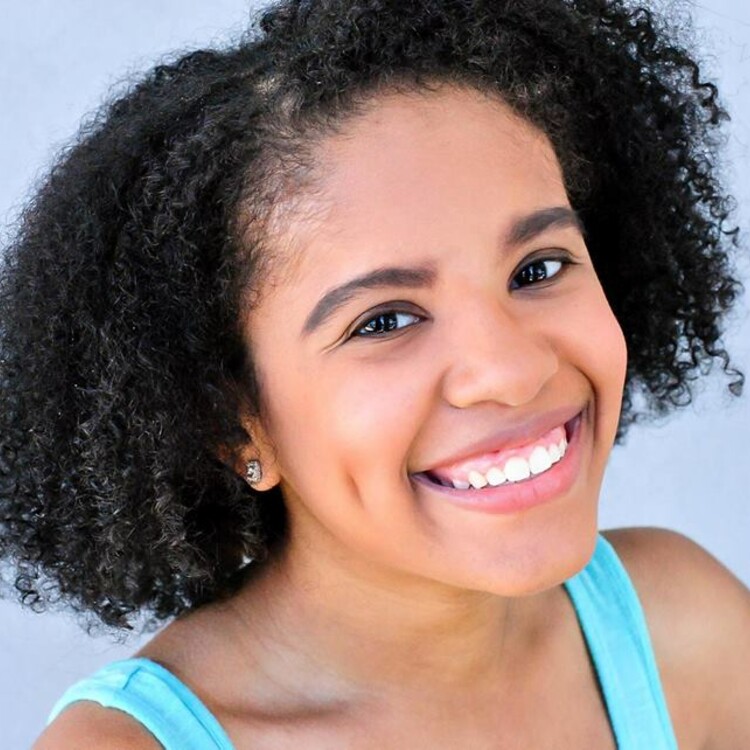
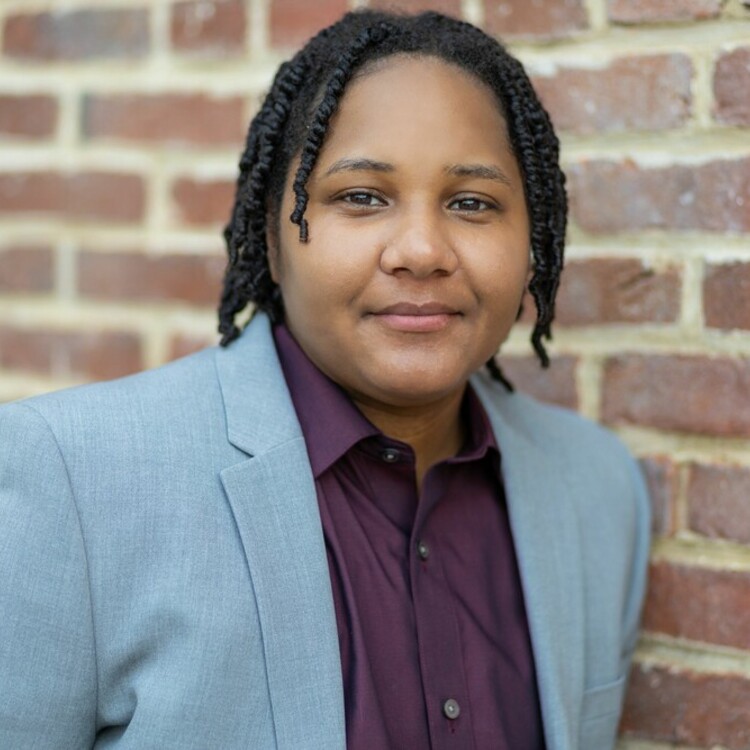
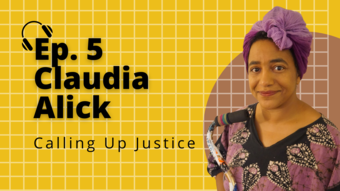


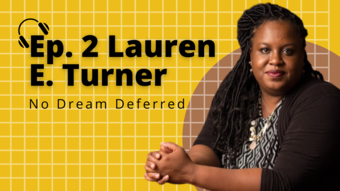

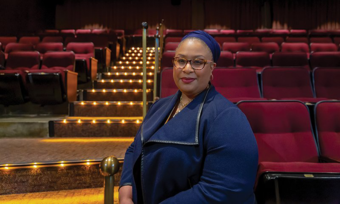



Comments
The article is just the start of the conversation—we want to know what you think about this subject, too! HowlRound is a space for knowledge-sharing, and we welcome spirited, thoughtful, and on-topic dialogue. Find our full comments policy here
Does anybody have a reference/ link to the Program Note essay mentioned by Shange about being subjectively tied to work? Would lvoe to read/ reference it :)